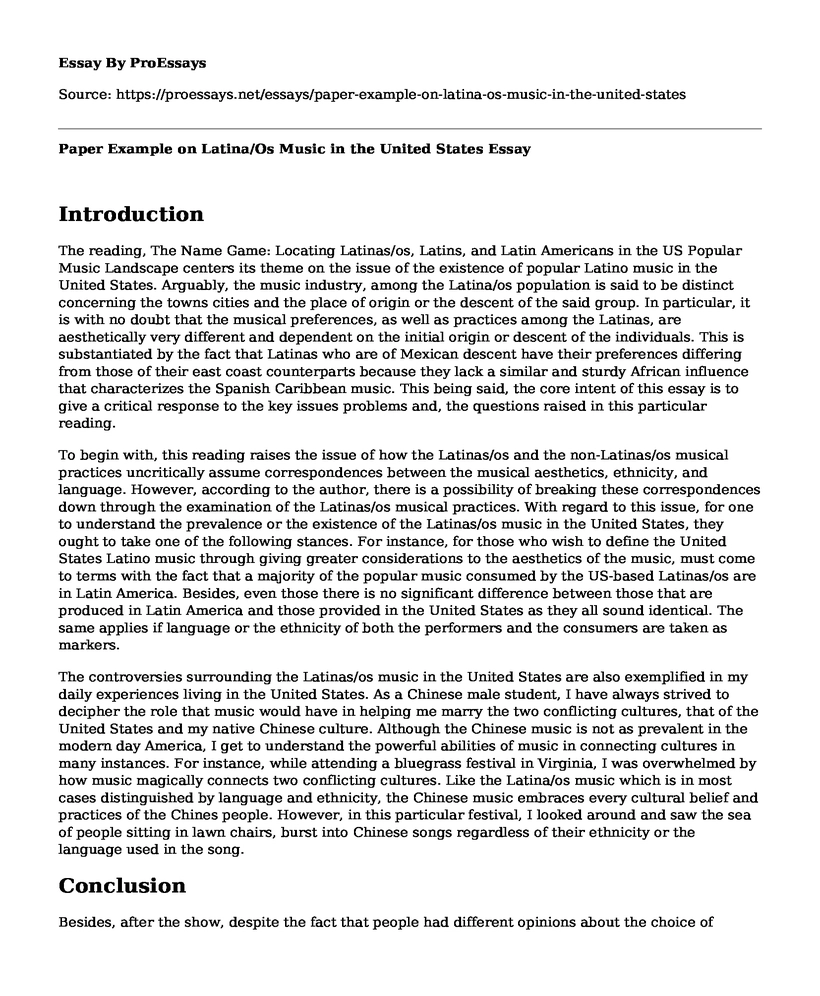Introduction
The reading, The Name Game: Locating Latinas/os, Latins, and Latin Americans in the US Popular Music Landscape centers its theme on the issue of the existence of popular Latino music in the United States. Arguably, the music industry, among the Latina/os population is said to be distinct concerning the towns cities and the place of origin or the descent of the said group. In particular, it is with no doubt that the musical preferences, as well as practices among the Latinas, are aesthetically very different and dependent on the initial origin or descent of the individuals. This is substantiated by the fact that Latinas who are of Mexican descent have their preferences differing from those of their east coast counterparts because they lack a similar and sturdy African influence that characterizes the Spanish Caribbean music. This being said, the core intent of this essay is to give a critical response to the key issues problems and, the questions raised in this particular reading.
To begin with, this reading raises the issue of how the Latinas/os and the non-Latinas/os musical practices uncritically assume correspondences between the musical aesthetics, ethnicity, and language. However, according to the author, there is a possibility of breaking these correspondences down through the examination of the Latinas/os musical practices. With regard to this issue, for one to understand the prevalence or the existence of the Latinas/os music in the United States, they ought to take one of the following stances. For instance, for those who wish to define the United States Latino music through giving greater considerations to the aesthetics of the music, must come to terms with the fact that a majority of the popular music consumed by the US-based Latinas/os are in Latin America. Besides, even those there is no significant difference between those that are produced in Latin America and those provided in the United States as they all sound identical. The same applies if language or the ethnicity of both the performers and the consumers are taken as markers.
The controversies surrounding the Latinas/os music in the United States are also exemplified in my daily experiences living in the United States. As a Chinese male student, I have always strived to decipher the role that music would have in helping me marry the two conflicting cultures, that of the United States and my native Chinese culture. Although the Chinese music is not as prevalent in the modern day America, I get to understand the powerful abilities of music in connecting cultures in many instances. For instance, while attending a bluegrass festival in Virginia, I was overwhelmed by how music magically connects two conflicting cultures. Like the Latina/os music which is in most cases distinguished by language and ethnicity, the Chinese music embraces every cultural belief and practices of the Chines people. However, in this particular festival, I looked around and saw the sea of people sitting in lawn chairs, burst into Chinese songs regardless of their ethnicity or the language used in the song.
Conclusion
Besides, after the show, despite the fact that people had different opinions about the choice of music, I heard quite a number of members of the audience tell stories about their connections to China and what this kind of music meant to them, regardless of all the correspondences that are bound to ethnicity, language or personal preferences.
Cite this page
Paper Example on Latina/Os Music in the United States. (2022, May 23). Retrieved from https://proessays.net/essays/paper-example-on-latina-os-music-in-the-united-states
If you are the original author of this essay and no longer wish to have it published on the ProEssays website, please click below to request its removal:
- Personality Theory in the Media
- Death and the Maiden
- How Social Media Affects One's Self-Esteem Essay
- The Use of Different Lighting and Camera Angles Essay
- The Importance of Hairspray: The Musical to Society Essay Example
- DMX: From Baltimore to NYC Streets to Rap Star - Essay Sample
- Essay Example on Rick & Morty: Indictment for Burglary & Other Crimes







